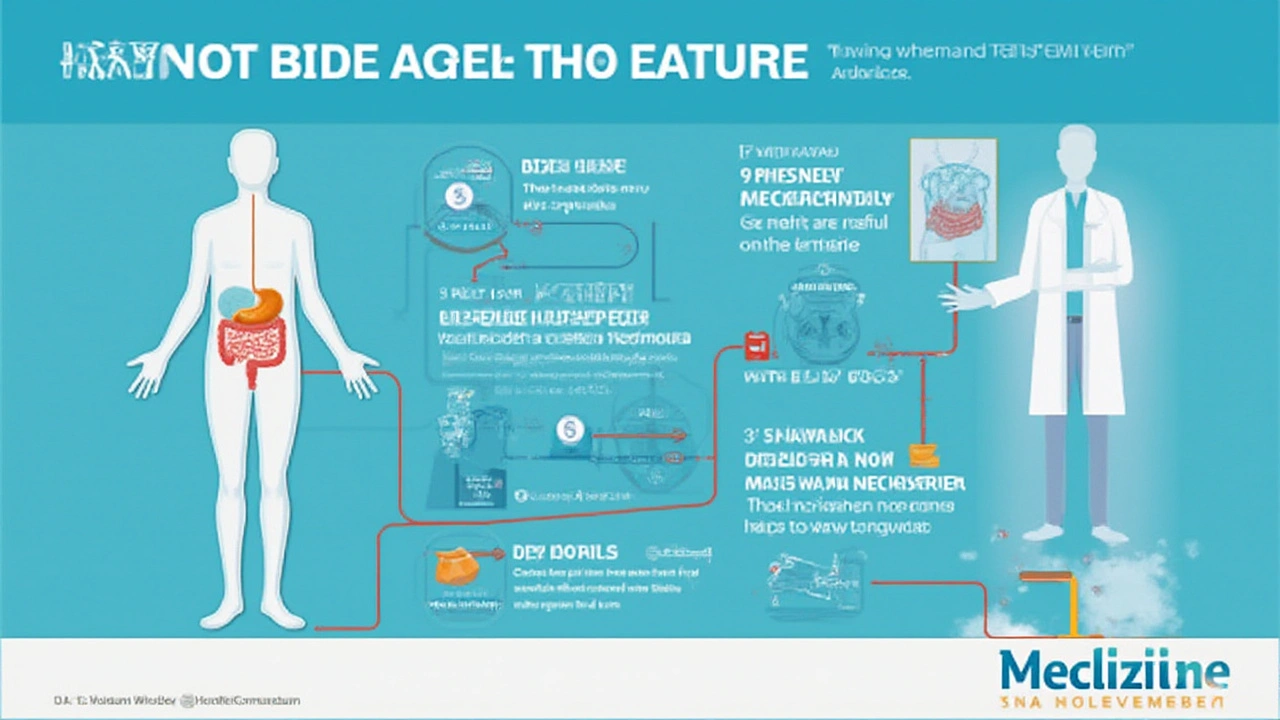Meclizine: Dosage, Uses, Side Effects & Tips for Nausea Relief
 Jun, 27 2025
Jun, 27 2025
Ever felt like the room is spinning so fast you can't keep your breakfast down? That sudden lurch when a car takes a sharp corner? That's where meclizine often steps in—this humble tablet has quietly stopped countless waves of nausea for folks trying to work, vacation, or just enjoy a simple boat ride. What’s surprising is just how many people rely on this medication every year. Millions of prescriptions go out annually in North America, making it almost as common in home medicine cabinets as acetaminophen or antacids. Yet, for all its helpful relief, hardly anyone outside of doctor’s offices really talks about how this drug does what it does, or what you should watch out for. Let's change that. If you or someone you love deals with motion sickness, vertigo, or those mysterious dizzy spells, stick around—there's more to meclizine than meets the eye.
What Exactly Is Meclizine?
Meclizine sounds like something you'd find in a lab, but it's been around since the late 1950s—prescribed for everything from the classic car sickness to the complicated world of inner ear problems. The way it actually works is kind of clever: meclizine blocks certain messages in your brain, specifically those responsible for sending "I’m dizzy" or "I feel sick" alerts. It’s what doctors call an antihistamine, but not the kind you’d take for allergies—this one targets your sense of balance. The brain’s “vomiting center” and parts controlling balance are very close, which is why motion sickness and vertigo feel so similar. Meclizine tamps down those signals making you feel like you’re on a rollercoaster, even when you’re just sitting still.
It’s usually sold as a small tablet (the common brand being Bonine or Dramamine Less Drowsy Formula in the U.S.), but here in Canada, you’ll find it under names like Gravol Ginger-Meclizine or generic meclizine. It’s usually available over-the-counter, but sometimes you’ll get a prescription for higher doses if your vertigo hits hard. What’s neat about meclizine: it doesn’t start working instantly. Most people need to take it an hour before heading out on a trip. The reason? It takes time to settle into your system and start blocking those dizzy signals before your inner ear gets confused.
You might wonder if it works for every kind of nausea. Not quite. It shines brightest against motion sickness, whether you're driving through mountain roads, hopping on a ferry, or jetting off in turbulence. It's also a favorite for people riding coasters or virtual reality rides—yes, even VR can mess with your equilibrium! If you’ve got dizziness linked to inner ear disorders, like labyrinthitis or Ménière's disease, docs turn to meclizine to help you walk, cook, or just get through the daily routine without feeling like you’re about to tip over. It doesn’t take care of every cause of nausea (like food poisoning or migraines), but it’s a workhorse for those spinning, whirling, swaying spells no one wants.
Of course, the science is always evolving. A few clinical studies, including one published in Neurology in 2022, showed meclizine dramatically cut the severity of vertigo symptoms for inner ear disorders—advertising up to a 60% improvement in some people after regular dosing. But there is a catch: it doesn’t “heal” your balance problems, it simply calms them down. Still, for anyone who’s lost a weekend planning around their stomach or head spinning, that relief can feel like magic.
How to Use Meclizine Safely and Effectively?
Here’s a secret your pharmacist wishes everyone knew: timing is everything with meclizine. Pop a pill after you’ve already gone green in the car backseat, and the boat’s already sailed (pun intended). Most recommendations say take it at least 30 minutes to an hour before the trigger—whether that’s getting behind the wheel, hopping on a plane, or stepping onto a roller coaster. If you know you get nauseated just walking through a boat marina, be safe and go for the full hour ahead. The idea is to let the med buffer your brain before trouble starts.
Standard adult dosage hovers around 25-50 mg at a time, not more than once every 24 hours for basic motion sickness. Kids? They get a much smaller dose and, if they’re under 12, check with a pediatrician first—it’s not officially approved for very young children. And for the forgetful souls (me included!), stick a reminder on your phone or keep a travel pack of meclizine in your glove box. If you miss the window, remember that taking it later might blunt the symptoms, but won’t chase the feeling away like pre-emptive dosing.
Now, everyone processes meds differently. Got other health conditions or take several meds? This is where you need to loop in your doctor or pharmacist. Meclizine can mess with other drugs, especially those making you drowsy, like sleeping pills, some anti-anxiety drugs, or even certain types of pain killers. Let’s get real: if you're going wine-tasting and plan to take meclizine too, you’re asking for a nap, not a vineyard tour. It’s not a strict “no,” but know that alcohol and meclizine multiply the sedative effect.
The elderly are another story—meclizine hangs around longer in their systems, upping the risk for sleepy confusion or even falls. If you’re over 65, doctors will likely suggest the lowest effective dose and may limit it to busy “motion” days only—not 24/7. Pregnant or breastfeeding? Talk it over with your doctor; while meclizine is generally considered low-risk in pregnancy (it’s Category B in the U.S.), it hasn’t been studied to death, so it’s a “double-check” situation. A 2023 Canadian study reviewing pregnancy outcomes with meclizine use found no increase in birth defects, but again—personalized advice rules the day.
- Take meclizine at least 30-60 minutes before motion exposure.
- Stick with the lowest effective dose; don’t double up if you missed a dose.
- Don’t mix with heavy sedatives, alcohol, or allergy pills unless your healthcare provider is onboard.
- Store in a cool, dry place (medicine cabinets get humid, so a bedroom drawer is safer).
- Keep out of reach of kids and pets. Luna, my cat, once tried to join my medicine audit—luckily, she prefers treats over meds!

Common—And Not-So-Common—Side Effects
Unlike some powerful nausea meds that knock you out, meclizine strikes a balance with its side effect profile. Still, don’t let its “less drowsy” marketing fool you. Sleepiness is the number one thing you’ll notice—most people feel a little slower or mellower, especially if they’re sensitive to antihistamines. Dry mouth is another frequent visitor, so keep some water handy or chew sugar-free gum (it works wonders). Sometimes, people notice blurry vision, feeling a bit "off" or mildly confused. Drop in blood pressure isn’t common, but if you get lightheaded when standing up, hydrate and take it slow.
If you’re sensitive to medications, the list can get longer but usually sticks to manageable symptoms: fatigue, a strange taste in your mouth, or a mild headache. Actual allergic reactions—rash, swelling, trouble breathing—are rare but possible (less than 1%). More disturbing are serious side effects like irregular heartbeats or trouble urinating, but these are so unusual most users will never meet them. Still, memorize a quick checklist: If you notice swelling, trouble walking straight, chest pain, or severe confusion, that’s a signal to get help.
If you want to see the kind of stats meclizine racks up in adverse effect reports, here’s a simple breakdown:
| Side Effect | Frequency (%) |
|---|---|
| Drowsiness | ~10-17% |
| Dry Mouth | ~6-10% |
| Headache | ~2-3% |
| Allergic Reactions | <1% |
| Severe Confusion (elderly) | 0.5-2% |
| Irregular Heartbeat | <0.1% |
What if you overdo it? There’s no need to panic, but expect a rough day—nausea, vomiting, extreme sleepiness, or even a racing heart if you’ve gone far above the typical dose. If you or someone else downs more than what’s written on the label, especially kids or small pets (seriously, Luna!), call your local poison center or emergency room. Better safe than sorry.
Who Should Avoid Meclizine?
Look, every medication has its "no-go" list, and meclizine is no exception. For starters, people allergic to meclizine or related antihistamines (like cyclizine) shouldn’t touch it. If you’ve ever had bad reactions to motion sickness drugs, steer clear. Pregnant people should only use it when the benefit is bigger than the risk—it's not a straight-out ban, but talk it over with your OB or midwife.
Specific medical problems can make meclizine a tricky choice. If you have glaucoma, meclizine can raise eye pressure—bad news if your pressure is already high. Urinary retention is another biggie: people with prostate issues or blockages should avoid this med unless a urologist is supervising. The same goes for people with asthma, since all antihistamines can occasionally dry up airways and make breathing harder.
Anyone on heavy-duty sedatives, or dealing with mental confusion or dementia, should use meclizine with caution, if at all. The sedative effects can add up quickly, and you don't want a simple anti-nausea pill tipping you into grogginess or falls. And just as importantly, folks who drive for a living or work with heavy machinery should test meclizine at home on a chill day—if you get dozy, that’s a sign it could impair your reflexes behind the wheel. It usually wears off within 24 hours, but always be cautious the first few times.
- Avoid if you’re allergic to meclizine or similar antihistamines.
- Talk to your healthcare provider if you have glaucoma, prostate problems, urinary retention, or asthma.
- Avoid heavy alcohol use or mixing with sedatives.
- Test a small dose before travel if you’ve never used it—watch for sleepy side effects.
There's truly no "one size fits all" when it comes to meclizine—or any medication, really. It might work wonders for your neighbor and barely touch your symptoms, or vice versa. If you ever start something new (especially if you already juggle other prescriptions), pop into your local pharmacy for a quick expert opinion. In Vancouver, we’re lucky to have pharmacies that welcome these questions, and honestly, most pharmacists prefer this over reading reviews online!

Tips, Tricks, and Life With Meclizine
Living with nausea or vertigo means you get pretty creative, and meclizine can become a silent buddy for travel, work, or hobbies. Traveling? Tuck tablets in a visible pocket of your backpack—nothing’s worse than rifling through luggage as the ferry leaves the dock. For chronic conditions like frequent vertigo, some folks keep a readiness kit at home: meds, ginger chews, an eye mask, and a water bottle. One pro tip—chew gum or suck a mint right after taking meclizine; it helps with dry mouth and that funny aftertaste.
Motion sickness apps are popping up, too. Paired with meclizine, they coach you through focus and breathing exercises, which can double your comfort. Set reminders for your dosing schedule, especially if your triggers are unpredictable. For the “travelers of the world” out there—bring your own trusted meclizine supply to countries that may not have the same brands.
Keeping meclizine handy for pets isn’t recommended unless your vet specifically says so—what works for humans could be dangerous for Luna or your neighbor's dog. And don’t forget, if you have kids: kids can get into anything, so stashing your anti-nausea meds high and out of their sight is just non-negotiable.
Some fun facts for your next dinner party: Did you know meclizine is sometimes used off-label for morning sickness? Or that astronauts-in-training used to test motion sickness meds in simulated zero gravity? Marine biologists and pilots often keep it on hand for jobs that spin the senses, and VR companies now recommend pre-dosing with meclizine for first-time headset users prone to VR motion blur. Real life, people.
- Pack meclizine in advance for road trips, cruises, or air travel.
- Pair with ginger chews or mints for the double-whammy anti-nausea effect.
- Use motion sickness apps as backup support.
- Store out of reach of children and pets—never medicate your cat or dog unless your vet approves.
- Track symptom triggers in a notebook or app, so you know when meclizine will help most.
If you’re reading this with one eye on a wobbly travel itinerary, or searching for relief from vertigo that keeps you off your feet, just know you’re not alone. The right use of meclizine, at the right dose and timing, can truly make a difference. And for those of us who’ve lost days to spinning rooms or queasy rides, that’s peace of mind in a little pill.
Dan Burbank
July 10, 2025 AT 00:29Ah, meclizine, the antihistamine wonder often misunderstood by the casual layperson.
One must appreciate its nuanced pharmacodynamics, especially when it comes to motion sickness and vertigo management - far more effective than those quaint remedies people rely on.
But let's not romanticize it too much; dosage precision is paramount, and ignoring side effects, particularly drowsiness and anticholinergic impacts, is nothing short of reckless.
Frankly, anyone self-medicating without proper guidance borders on folly.
Has anyone else noticed how the variance in effectiveness seems to depend heavily on individual metabolism rates and concurrent medications?
I would caution users to thoroughly research, as blind trust in any OTC or prescription drug is a slippery slope.
Only the informed should dare wield this compound.
Anna Marie
July 10, 2025 AT 14:23Thanks for this deep dive — it’s genuinely helpful to have a comprehensive overview like this.
Meclizine has been a lifesaver for some folks I know who suffer from chronic dizziness and nausea, especially those with vestibular disorders.
What I appreciate most is the practical advice on how to manage side effects, because sometimes the drowsiness can be overwhelming.
I also found it reassuring to see the emphasis on proper dosage; it's so important we follow medical guidance carefully.
I'm curious though, are there specific lifestyle tips that can complement meclizine usage to maximize its benefits while keeping side effects at bay?
Sometimes, being mindful about hydration and meal timing seems to make a difference, but I’d love to hear more.
Any input from others on this?
Abdulraheem yahya
July 11, 2025 AT 04:16Oh, this post hits close to home for me.
I've personally battled persistent nausea and dizziness over the years, and meclizine was prescribed a few times.
The thing is, while it helps tremendously, the experience of side effects varies wildly among users.
Some say it knocks them out cold, others say they barely notice it.
I think it comes down to individual body chemistry, as well as interactions with other medications or supplements one might be taking.
That said, I appreciate the detailed dosage tips because those can often be overlooked.
By the way, does anyone know if prolonged use affects tolerance or efficacy?
Rex Wang
July 12, 2025 AT 08:03Great post.
Meclizine is widely used and generally safe when taken as directed.
One point that might get overlooked is how it impacts cognitive functions; some feel foggy the next day.
Have you noticed this with your patients or users?
Also, the timing of doses matters a lot.
Taking it before travel, for instance, can mitigate motion sickness more effectively than reacting once symptoms start.
mark Lapardin
July 15, 2025 AT 19:23The article does a decent job but leaves out some jargon-heavy insights that are crucial.
For instance, the antihistaminic profile of meclizine, while reducing vestibular stimulation, can lead to anticholinergic burdens that might exacerbate cognitive decline in susceptible populations.
Dosing strategies need to consider this balance very delicately.
Has anyone here consulted recent pharmacokinetic studies about steady-state concentration impacts?
I'd argue that a more tailored approach is warranted, rather than the one-size-fits-all dosage typical in many guidelines.
Barry Singleton
July 16, 2025 AT 23:09Honestly, most people overestimate how benign medications like meclizine are.
Yes, it can relieve nausea, but the side effects are often swept under the rug.
Drowsiness, dry mouth, even paradoxical excitement, these are nontrivial.
Sometimes it feels like a band-aid for deeper issues rather than a real solution.
Anyone else think that relying on meclizine too much might mask underlying vestibular problems that need proper diagnosis?
It’s not a miracle drug by any means.
We should demand better treatment protocols overall.
Javier Garcia
July 22, 2025 AT 18:03Quick question — is meclizine considered safe for elderly patients with multiple meds?
The article mentions side effects but not much about drug interactions specifically.
For those with polypharmacy, this seems like an important consideration.
Would love input from anyone with clinical experience here.
Donnella Creppel
August 1, 2025 AT 00:16Okay, real talk: meclizine might be the go-to, but don’t act like it’s some flawless potion.
The side effects can be a nightmare for some, especially cognitive sluggishness that feels like a hangover without the fun.
Also, let's call out the often diminished warnings about combining it with alcohol or benzos — a disaster waiting to happen.
People tend to overlook these risks because the promise of quick nausea relief blinds them.
Is anyone else skeptical about how fast this stuff gets sold over the counter without enough caution?
Like, seriously, it requires more responsible dispensing.
christian quituisaca
August 6, 2025 AT 19:09This discussion has been enlightening.
In my experience mentoring those new to managing nausea symptoms, meclizine is a powerful tool but not without its quirks.
It’s essential to pair it with lifestyle adaptations — proper hydration, avoiding rapid head movements, and controlling triggers whenever possible.
Also, tailoring the timing and dose to individual rhythm can optimize outcomes and reduce adverse effects.
We shouldn’t forget that patient education is key — a colorful array of tips can transform how comfortable someone feels while on meclizine.
Has anyone incorporated mindfulness or relaxation techniques in conjunction with meclizine use?
Would love to hear success stories or cautionary tales.